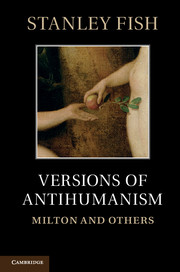Book contents
- Frontmatter
- Contents
- Acknowledgments
- Introduction: intention, historicism and interpretation
- Part I Milton
- Part II Early modern literature
- Chapter 8 “Void of storie”
- Chapter 9 Authors–readers
- Chapter 10 Marvell and the art of disappearance
- Chapter 11 Masculine persuasive force: Donne and verbal power
- Chapter 12 How Hobbes works
- Index
- References
Chapter 10 - Marvell and the art of disappearance
Published online by Cambridge University Press: 05 May 2012
- Frontmatter
- Contents
- Acknowledgments
- Introduction: intention, historicism and interpretation
- Part I Milton
- Part II Early modern literature
- Chapter 8 “Void of storie”
- Chapter 9 Authors–readers
- Chapter 10 Marvell and the art of disappearance
- Chapter 11 Masculine persuasive force: Donne and verbal power
- Chapter 12 How Hobbes works
- Index
- References
Summary
Murray Krieger ends his recent book, The Institution of Theory, by pleading guilty to the charge that, even after all these years, he is still an “apologist for poetry.” These days being an apologist for poetry means resisting the various historicisms – old, new, cultural, material – whose expansive arguments are made at the expense of the aesthetic, a category (and area) that either disappears in the analysis of “discursive systems” or is identified (and stigmatized) as the location of a status-quo politics anxious to idealize its own agendas. Krieger's strategy is to claim for poetry what our new theorists claim for history and politics: the capacity to complicate and, by complicating, disperse the power of ideological formations. Rather than being in need of demystification, the literary text instructs us in the art – and, far in advance of deconstruction, performs the work – of undoing unities and opening up apparent closures: “totalization is that which the discourse of ideology imposes, and it is that from which, potentially, the counter ideological discourse of the literary text can liberate us” (73). Literature, in short, is “counter theoretical” (87) – where by “theoretical” Krieger means “ideological” – and “in these ideological days, it is the pressure to resist, as well as the role of literature in supplying it, that is sorely needed” (75).
In essence, this is an up-to-date version of Sidney's Apology (itself a Renaissance refurbishing of Horace), but with a difference. While both Sidney and Krieger find a special job for literature to do – one beyond the capacities of either history or philosophy – in Sidney's argument that job is hortatory in a positive sense. The reader who, in one of Sidney's memorable examples, comes upon the image of Aeneas carrying old Anchises on his back will be moved to wish himself such a person and therefore be more inclined to act in that same way when the opportunity presents itself. (The moment and the lesson are the essence of humanism.)
- Type
- Chapter
- Information
- Versions of AntihumanismMilton and Others, pp. 206 - 226Publisher: Cambridge University PressPrint publication year: 2012



